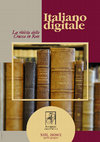LIBRI by Michele Colombo
®® aculeato agg. • fornito di aculeo ® acume s.m. • (lett.) acutezza • ingegno vivo • (lett.) int... more ®® aculeato agg. • fornito di aculeo ® acume s.m. • (lett.) acutezza • ingegno vivo • (lett.) intensità di sensazione o sentimento [da acumen s.n. 'punta', 'pungiglione', 'cima', da acuere v.]

La Bibbia dopo Trento Com'è noto, per la liturgia l'abbandono del lati no giunge solo con il conc... more La Bibbia dopo Trento Com'è noto, per la liturgia l'abbandono del lati no giunge solo con il concilio Vaticano II. In Italia ciò non significa necessariamente, per i secoli pre cedenti, un'irrimediabile distanza dei fedeli dal si gnificato dei riti cui partecipavano: lo testimonia no alcune espressioni italiane e dialettali derivate dalla lingua liturgica nelle quali il senso del termi ne latino, latamente inteso, è afferrato con chiarez za, per esempio far l'agnusdei «fare l'umile, suppli care», recitare il confiteor o il mea culpa «ammettere i propri peccati», il milanese fà dì la diesira a qualcu no «farlo pentire», ricavato dal Dies irae, o il verone se domino tobisco usato come generico appello augu rale, dal Dominus vobiscum dell'Oratio e del Praefatio. Certo però a tali modi di dire se ne affiancano altri in cui la deformazione del termine di parten za, oltre che da intenti parodici, sarà stata causa ta da un'incomprensione di fondo: a Vittorio Ve neto l'espressione nobis scroche pecatoribus «parassi ta» prende le mosse da nobis quoque peccatoribus, in crociato col verbo scrocàr «scroccare»; a Chioggia Dio ne libera dai pericoli scontri richiama la preghie Lapislazzuli
Quando, qualche anno orsono, mi accinsi a studiare l'opera grammaticale di Benedetto Buommattei, ... more Quando, qualche anno orsono, mi accinsi a studiare l'opera grammaticale di Benedetto Buommattei, ero spinto dall'impressione che l'argomento potesse costituire un punto d'incontro tra diversi campi d'indagine che destavano il mio interesse. In particolare, il corso del lavoro ha evidenziato la rilevanza, per un'edizione dei libri Della lingua toscana, di studi che nascessero dalla bibliografia, dalla filologia italiana, dalla storia della lingua italiana, da quella della riflessione grammaticale e linguistica. D'altra parte, nel pensare a questi settori, mi è inevitabile l'associazione ai nomi di chi, nella mia storia, ne è stato testimone appassionato e competente:
CURATELE by Michele Colombo
Atti del convegno (Milano, 6-7 novembre 2007) a cura di M C Mucchi Editore Modena
ARTICOLI by Michele Colombo
The opinions of Alessandro Manzoni and Graziadio Isaia Ascoli regarding the best way of increasin... more The opinions of Alessandro Manzoni and Graziadio Isaia Ascoli regarding the best way of increasing the use of the Italian language within the newly formed Italian state diverged significantly. However, there was common ground on some points. First, they were more interested in what the best linguistic model would be rather than in how to spread it among the people. Second, they were focusing on the educated public rather than the common people. Third, they both tended to overestimate the success of the foreign models of linguistic unification that they were studying. As far as the first two points are concerned, a more pragmatic perspective was expressed by Raffaello Lambruschini, although his contribution lacked a constructive aspect.
Francesco Panigarola’s book Il predicatore, published after the author’s death in 1609, was one o... more Francesco Panigarola’s book Il predicatore, published after the author’s death in 1609, was one of the most influential treatises about vernacular preaching in the seventeenth century. It is a common opinion that the linguistic prescriptions contained in the book chapter Apparato per la seconda parte follow the path traced by Pietro Bembo and Benedetto Varchi. However, a close reading shows that Panigarola supports a new linguistic model, more open to the needs of modern times.

L’articolo fornisce un elenco di 80 italianismi presenti in svedese, da aperitivo a villa: di que... more L’articolo fornisce un elenco di 80 italianismi presenti in svedese, da aperitivo a villa: di questi, 30 sono prestiti diretti dall’italiano, 34 sono mediati dal francese, 16 dal tedesco, dall’inglese o da altre lingue germaniche. Si aggiungono inoltre cinque parole create in svedese in base a modelli italiani. L'elenco di italianismi si fonda su un corpus di articoli pubblicati sotto la categoria “Italien” nella versione in linea del quotidiano svedese Dagens Nyheter durante i primi sei mesi del 2019. Per ogni lemma si forniscono l’informazione grammaticale, una o più definizioni, la data della prima attestazione, i primi tre passi in cui il lessema appare in una certa accezione, la traduzione italiana dei passi, ulteriori forme lessicali non presenti nei passi citati e il numero totale di occorrenze nel corpus. Seguono ulteriori annotazioni.
The article provides a list of 80 Italian loanwords that may be found in Swedish today, from "aperitivo" to "villa": 30 of them are direct loans from Italian, 34 have been imported through French, 16 through German, English or some other Germanic language. We also add a short list of five words formed in Swedish on the basis of an Italian loanword. Our list is based on a corpus of articles published under the category "Italien" on the online version of the Swedish newspaper Dagens Nyheter during the first six months of 2019. For every headword we provide grammatical information, one or more definitions, the date of the first attestation, the first three passages where the lexical unit occurs in a certain meaning, an Italian translation of the passages, additional word forms that are not present in the quoted passages and the total number of occurrences in the corpus. Some comments follow.
The article is an introduction to the monographic issue of Moderna Språk dedicated to Pasolini (h... more The article is an introduction to the monographic issue of Moderna Språk dedicated to Pasolini (https://publicera.kb.se/mosp/issue/view/1507). It explains the reasons why the special issue was created and summarizes the articles content
Gli articoli proposti per la pubblicazione nella rivista sono sottoposti anche al parere di due r... more Gli articoli proposti per la pubblicazione nella rivista sono sottoposti anche al parere di due revisori anonimi esterni al Comitato. •

Italiano digitale XIII, 2020/2 (aprile-giugno)-p. iii Sommario EDITORIALE Editoriale del direttor... more Italiano digitale XIII, 2020/2 (aprile-giugno)-p. iii Sommario EDITORIALE Editoriale del direttore 1 Marco Biffi CONSULENZE LINGUISTICHE Che cosa significa e da dove nasce il buon senso? 3 Vittorio Coletti È stata richiesta una consulenza su consulenziale 5 Anna M. Thornton Condoglianze e cordoglio: le differenze tra due parole oggi (purtroppo) attuali 7 Kevin De Vecchis Falsi sinonimi: omesso / omissato 10 Sergio Lubello Autorizzativo e autorizzatorio 12 Vittorio Coletti Caduti in/di guerra, in/del mare, sul lavoro: espressioni diverse per tenere viva la memoria su eventi ugualmente tragici 15 Raffaella Setti Data breach o violazione dei dati? 19 Michele A. Cortelazzo Si deve aerare, aereare o areare un ambiente? L'importante è ventilarlo! 22 Paolo D'Achille Dècade: solo dieci giorni o anche dieci anni? 24 Giuseppe Patota Nel contempo e al contempo 26 Rita Librandi Efficientamento ed efficientare sono efficienti! 30 Vittorio Coletti Nulla osta all'uso del congiuntivo! 32 Paolo D'Achille Speriamo di non sbucciarci un ginocchio: meglio se ci sbucciamo mandarini e frutta secca 35 Miriam Di Carlo Si può fomentare anche il bene: è soltanto più raro 41 Kevin De Vecchis Bollettatore e fatturatore 45 Vittorio Coletti Divieto di assembramento o di assemblamento? 47 Luisa di Valvasone Concussione 52 Michele Colombo Filo di lana o filo di lama? 54 Paolo Rondinelli Alla fine saremo esausti (non esauriti), ma prima proveremo a esaudire le vostre richieste con una risposta esauriente (o esaustiva?) 57 Paolo D'Achille Come si abbrevia, come si scrive e come si legge "24 ore su 24"? 60 Vittorio Coletti Bensì non significa 'inoltre', ma 'ma' 61 Paolo D'Achille Triage 63 Miriam Di Carlo Stati generali 71 Claudio Giovanardi È possibile evidenziare le evidenze? Storia e fortuna di un calco anglicizzante 73 Riccardo Gualdo LA CRUSCA RISPOSE Di krapfen e graffe 77 Vera Gheno Qual è il verbo più adatto per la pizza: condire, guarnire o farcire? 81 Ugo Vignuzzi Andiamo a... servire la risposta! 84 Giovanna Frosini PAROLE NUOVE Droplet: piccole gocce nell'oceano dell'informazione 87 Miriam Di Carlo Microplastica/microplastiche 94 Raffaella Setti Distanziamento sociale 100 Luisa di Valvasone L'italiano è uscito dal lockdown
Some influential studies about medieval northern Italian dialects argue that if a subject pronoun... more Some influential studies about medieval northern Italian dialects argue that if a subject pronoun occupies the first position in a sentence it should not be regarded as clitic, because of the Tobler Mussafia law. However, evidence suggests that Tobler Mussafia law did not apply to subject clitic pronouns, but only to object ones. It is therefore worth inquiring when a subject pronoun may be seen as clitic in medieval northern Italian dialects: four criteria are set forth.
salerno editrice s.r.l., roma. sono rigorosamente vietati la ripro duzione, la traduzione, l'adat... more salerno editrice s.r.l., roma. sono rigorosamente vietati la ripro duzione, la traduzione, l'adattamento, anche parziale o per estratti, per qual sia si uso e con qualsiasi mezzo effettuati, compresi la copia fotostatica, il mi cro film, la memorizzazione elettronica, ecc., senza la preventiva autorizzazione scritta della salerno editrice s.r.l. ogni abuso sarà perseguito a norma di legge.











Uploads
LIBRI by Michele Colombo
CURATELE by Michele Colombo
ARTICOLI by Michele Colombo
The article provides a list of 80 Italian loanwords that may be found in Swedish today, from "aperitivo" to "villa": 30 of them are direct loans from Italian, 34 have been imported through French, 16 through German, English or some other Germanic language. We also add a short list of five words formed in Swedish on the basis of an Italian loanword. Our list is based on a corpus of articles published under the category "Italien" on the online version of the Swedish newspaper Dagens Nyheter during the first six months of 2019. For every headword we provide grammatical information, one or more definitions, the date of the first attestation, the first three passages where the lexical unit occurs in a certain meaning, an Italian translation of the passages, additional word forms that are not present in the quoted passages and the total number of occurrences in the corpus. Some comments follow.
The article provides a list of 80 Italian loanwords that may be found in Swedish today, from "aperitivo" to "villa": 30 of them are direct loans from Italian, 34 have been imported through French, 16 through German, English or some other Germanic language. We also add a short list of five words formed in Swedish on the basis of an Italian loanword. Our list is based on a corpus of articles published under the category "Italien" on the online version of the Swedish newspaper Dagens Nyheter during the first six months of 2019. For every headword we provide grammatical information, one or more definitions, the date of the first attestation, the first three passages where the lexical unit occurs in a certain meaning, an Italian translation of the passages, additional word forms that are not present in the quoted passages and the total number of occurrences in the corpus. Some comments follow.
The contrast between a formal and an everyday language in vernacular preaching can take diverse forms. The first aspect is the relationship between Latin and vernacular: manifested either as a distinct option in favour of one of the two languages, or as the use of Latin words or phrases within a vernacular text. In the latter case the amount and function of the Latin may vary. The second aspect of the problem is the choice between literary Italian, the local vernacular or an intermediate variety. The third is the variation between a higher and a lower register within the Italian language.
Gospels. The text is preserved in a fourteenth-century manuscript of the Angelo Mai Library in Bergamo (Italy), and its prologue clearly shows that it was intended for reading aloud on Good Friday, perhaps in a brotherhood of laymen. The study argues that the «Passione Mai» is a translation from Latin and analyses its language, identifying it as ancient Venetian. Nonetheless, the language shows a few non-Venetian features, together with a Latin influence.
Enti organizzatori: Università Cattolica del Sacro Cuore, Dipartimento di Studi medioevali, umanistici e rinascimentali / Università di Verona, Scuola di dottorato in Scienze umanistiche.